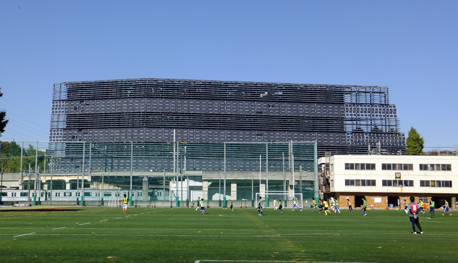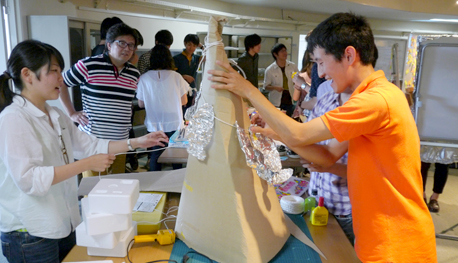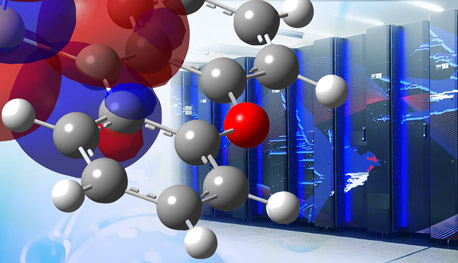Education
Transdisciplinary Science and Engineering
Undergraduate MajorCurriculum
Specialized education built on a broad foundation — a solid footing for researchers and engineers
Building on the foundational science courses taken in the first year, students progress to 200- and 300-level courses relevant to their major. The curriculum offered by the Department of Transdisciplinary Science and Engineering is designed to foster new types of science and engineering professionals with transdisciplinary training. At the core of the curriculum are mandatory Foundation in Mathematics Courses, Foundation in Engineering Courses, and Foundation in Co-creation Courses. Students also get to study a diverse range of fields through electives in International Development Courses, Resource and Energy Engineering Courses, Environmental Policy and Social Systems Courses, Global and Regional Environment Courses, Engineering Science and Design Courses, and Nuclear Engineering Courses.
There are two notable features of the department's instruction. One is the adoption of project-based learning (PBL) in Foundation in Co-creation Courses so that students may gain practical training in co-creative activities with diverse bodies of people. Another is the combined use of Japanese and English to teach required Foundation in Mathematics Courses and Foundation in Engineering Courses, with the aim of developing students' global competence.
-
1st Year
- 100-Level Courses
-
Students in their first year of undergraduate studies receive basic education that centers on Institute-wide compulsory courses regardless of their discipline. The 100-level courses are designed to teach common, basic skills required of science and technology students. The aims of these courses are to provide knowledge and cultivate the versatile intellect necessary for studying at the Institute.
-
2nd Year
3rd Year- 200-Level and 300-Level Courses
-
Students who complete their 100-level courses advance to study their undergraduate major. Courses at the 200- and 300-levels specific to the Transdisciplinary Science and Engineering Undergraduate Major are taken in accordance with the curriculum.
-
- Foundation in Mathematics Courses
- In these courses, students study mathematics, the common language among many disciplines, through the broad context of science and engineering and the introduction of real-world examples of mathematical applications.
-
- Foundation in Engineering Courses
- In these courses, students study universal concepts and theories common to engineering disciplines.
-
- Foundation in Co-creation Courses
- In these courses, students learn to solve problems using a design-thinking approach. They experience the process of identifying society's needs, considering possible solutions, building prototypes, assessment by users or beneficiaries, and reviewing solutions based on this feedback. Students also receive training in project management.
-
- Elective Courses
- Based on their interests and study goals, students are given the autonomy to select elective courses.
-
-
4th Year
- 200-Level and 300-Level Courses
-
At the final stage of the 300-level is the Independent Research Project (equivalent to the Undergraduate Thesis Research that was in place previously). The project is intended to serve as a capstone for students to consolidate and reinforce all the skills acquired in their Transdisciplinary Science and Engineering Undergraduate Major. Furthermore, they may choose to enroll in the Advanced Independent Research Project. The purpose of this course is to enhance student interest in scientific and technological research that began with the Independent Research Project, as it provides the opportunity for them to actively engage in science- and technology-related activities.
* The timeline depicts a standard case where students complete their bachelor's degree program in four years.
-
Entrance Examination
Students must pass an entrance exam to advance from a bachelor's to a master's program, and pass a screening to advance from a master's to a doctoral program.
-
Graduate Majors
Master's Program
Doctoral Program- 400-Level, 500-Level, and 600-Level Courses
-
Students who complete the Transdisciplinary Science and Engineering Undergraduate Major may continue to study the same field in more depth by taking the Global Engineering for Development, Environment and Society Graduate Major. There are also closely related interdisciplinary graduate majors — Energy Science and Informatics, Engineering Sciences and Design, Nuclear Engineering, and Materials and Information Sciences — to which students may advance.
-
- Department that offers this graduate major
-
- Transdisciplinary Science and Engineering
-
- Departments that offer this graduate major
-
- Chemistry/
- Mechanical Engineering/
- Electrical and Electronic Engineering/
- Materials Science and Engineering/
- Chemical Science and Engineering/
- Computer Science/
- Transdisciplinary Science and Engineering
-
- Departments that offer this graduate major
-
- Mechanical Engineering/
- Systems and Control Engineering/
- Information and Communications Engineering/
- Industrial Engineering and Economics/
- Architecture and Building Engineering/
- Civil and Environmental Engineering/
- Transdisciplinary Science and Engineering
-
- Departments that offer this graduate major
-
- Mechanical Engineering/
- Electrical and Electronic Engineering/
- Materials Science and Engineering/
- Chemical Science and Engineering/
- Transdisciplinary Science and Engineering
-
- Departments that offer this graduate major
-
- Physics/
- Chemistry/
- Electrical and Electronic Engineering/
- Materials Science and Engineering/
- Chemical Science and Engineering/
- Computer Science/
- Life Science and Technology/
- Transdisciplinary Science and Engineering
-





